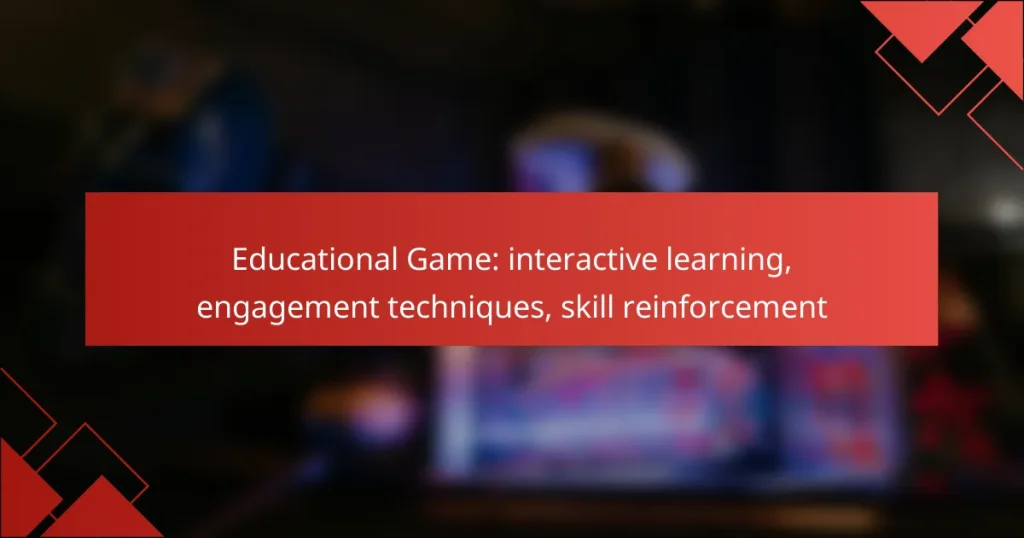Exploring different game types reveals a diverse landscape of gameplay experiences tailored to various player preferences. From the adrenaline-fueled action games that require quick reflexes to the immersive worlds of role-playing games, each genre offers unique mechanics and challenges. Understanding these distinctions can enhance player engagement and foster social interactions within gaming communities.
Educational Game: interactive learning, engagement techniques, skill reinforcement
Fighting Game: mastery of techniques, character matchups, tournament experience
Card Game: social dynamics, strategic depth, bluffing techniques
Action Game: skill mastery, reflex training, competitive spirit
Idle Game: passive engagement, satisfaction of growth, minimal effort
Simulation Game: real-world applications, skill practice, creative expression
Adventure Game: emotional engagement, exploration rewards, narrative choices
Horror Game: fear response, immersive storytelling, psychological impact
Puzzle Game: problem-solving skills, time management, satisfaction of completion
What are the most popular game types in the UK?
The most popular game types in the UK include action games, role-playing games, simulation games, sports games, and puzzle games. Each type offers unique gameplay experiences that cater to different player preferences and demographics.
Action games
Action games are characterized by fast-paced gameplay that emphasizes physical challenges, including hand-eye coordination and reaction time. Popular titles in this genre often feature combat, platforming, or shooting mechanics.
In the UK, action games like “Call of Duty” and “Fortnite” dominate the market, appealing to a wide audience. Players should consider their skill level and preferred play style when choosing an action game, as some may require quick reflexes while others focus more on strategy.
Role-playing games
Role-playing games (RPGs) allow players to assume the roles of characters in a fictional setting, often involving quests and character development. This genre emphasizes storytelling, character customization, and immersive worlds.
Popular RPGs in the UK include “The Witcher” series and “Final Fantasy.” When selecting an RPG, players should look for engaging narratives and gameplay mechanics that align with their interests, such as turn-based combat or real-time action.
Simulation games
Simulation games replicate real-world activities, allowing players to experience various scenarios, from managing a farm to running a city. These games often focus on strategy, planning, and resource management.
Titles like “The Sims” and “Cities: Skylines” are well-received in the UK. Players should consider the depth of simulation and the level of detail they desire, as some games offer extensive customization options while others provide a more streamlined experience.
Sports games
Sports games simulate real-world sports, allowing players to compete in various athletic activities. This genre includes everything from football and basketball to racing and golf.
In the UK, franchises like “FIFA” and “NBA 2K” are particularly popular. When choosing a sports game, players should consider the realism of the gameplay, the variety of modes available, and whether they prefer single-player or multiplayer experiences.
Puzzle games
Puzzle games challenge players to solve problems or complete tasks using logic and strategy. These games can range from simple match-three mechanics to complex brain teasers.
Popular puzzle games in the UK include “Candy Crush Saga” and “Tetris.” Players should look for games that match their skill level and offer a satisfying challenge without becoming overly frustrating.
How do different game types impact player experience?
Different game types significantly influence player experience by shaping engagement, social interaction, and skill development. Each genre offers unique mechanics and challenges that cater to varying player preferences and goals.
Engagement levels
Engagement levels vary widely across game types, affecting how immersed players feel. For instance, action games often provide fast-paced, adrenaline-pumping experiences that keep players on the edge of their seats, while puzzle games may offer slower, more contemplative engagement. Understanding these differences can help players choose games that align with their desired level of involvement.
Consider the time commitment as well; some games, like MMORPGs, can require extensive hours to fully engage, while casual mobile games may only need a few minutes of attention. Players should assess their available time and energy when selecting a game type.
Social interaction
Social interaction is another crucial aspect influenced by game types. Multiplayer games, such as first-person shooters or online battle arenas, foster teamwork and communication, often leading to strong social bonds among players. In contrast, single-player games may offer a more solitary experience, focusing on personal achievement and narrative immersion.
Players looking to enhance their social connections might prefer games that emphasize cooperative play or competitive environments. Engaging in community events or forums related to these games can further enrich the social experience.
Skill development
Skill development varies with game types, as each genre emphasizes different abilities. Strategy games often enhance critical thinking and planning skills, while rhythm games can improve hand-eye coordination and timing. Players should consider what skills they wish to develop when choosing a game type.
Additionally, some games provide structured learning curves, allowing players to gradually improve their skills. For example, many role-playing games (RPGs) offer tutorials and progressive challenges that help players build competence over time. Selecting games with clear skill progression can lead to a more satisfying learning experience.
What are the key features of action games?
Action games are characterized by fast-paced gameplay, real-time challenges, and engaging combat mechanics. These elements combine to create an immersive experience that demands quick reflexes and strategic thinking from players.
Fast-paced gameplay
Fast-paced gameplay is a hallmark of action games, often requiring players to make rapid decisions and execute them quickly. Levels are typically designed to keep players on their toes, with obstacles and enemies appearing unexpectedly.
Players can expect to engage in intense sequences that may last just a few minutes but feel much longer due to the adrenaline rush. Games like “Doom” or “Call of Duty” exemplify this aspect, where speed and agility are crucial for success.
Real-time challenges
Real-time challenges in action games require players to react instantly to dynamic situations. Unlike turn-based games, players must continuously adapt to changing environments and enemy behaviors.
These challenges often include timed missions or survival scenarios where players must complete objectives under pressure. For example, in “Fortnite,” players must build and defend while simultaneously engaging in combat, highlighting the need for quick thinking and adaptability.
Combat mechanics
Combat mechanics in action games are designed to be engaging and intuitive, often featuring a mix of melee and ranged attacks. Players typically have access to a variety of weapons and abilities that can be upgraded or customized throughout the game.
Understanding the combat system is essential for mastering any action game. For instance, in “Street Fighter,” players must learn combos and timing to effectively defeat opponents, while in “Assassin’s Creed,” stealth and strategy play a significant role in combat encounters.
What defines role-playing games?
Role-playing games (RPGs) are defined by their focus on character development, immersive storytelling, and player-driven choices. Players assume the roles of characters in a fictional setting, often engaging in quests and adventures that shape their characters’ growth and the overall narrative.
Character development
Character development in RPGs allows players to customize their characters’ abilities, skills, and traits. This process often involves leveling up, where characters gain experience points (XP) through various activities, leading to improved stats and new abilities.
Players can typically choose from various classes or archetypes, each with unique strengths and weaknesses. For example, a warrior may excel in combat, while a mage focuses on spellcasting. This diversity encourages strategic thinking and collaboration among players.
Story-driven narratives
RPGs are known for their rich, story-driven narratives that engage players emotionally and intellectually. The plot often unfolds through quests, dialogues, and character interactions, providing depth and context to the gameplay.
Many RPGs offer branching storylines where players’ choices impact the outcome of the game. This element of choice enhances replayability, as players can explore different paths and endings based on their decisions.
Open-world exploration
Open-world exploration is a hallmark of many RPGs, allowing players to roam vast, detailed environments at their own pace. This freedom encourages players to discover hidden quests, treasures, and lore that enrich the gaming experience.
Players can engage in side quests, interact with non-playable characters (NPCs), and uncover secrets that contribute to the overall narrative. This exploration often leads to a sense of immersion, making the game world feel alive and dynamic.
How do simulation games replicate real-life experiences?
Simulation games replicate real-life experiences by creating immersive environments that mimic real-world scenarios, allowing players to engage in activities that reflect actual life situations. These games often focus on realistic mechanics and decision-making processes that challenge players to think critically and manage resources effectively.
Realistic scenarios
Simulation games often present players with scenarios that closely resemble real-life situations, such as managing a city, running a farm, or piloting an aircraft. These scenarios require players to make decisions based on realistic factors, including economic conditions, environmental challenges, and social dynamics.
For example, in a city-building simulation, players must consider zoning laws, traffic management, and public services, reflecting the complexities of urban planning. This realism enhances the gaming experience and can provide insights into real-world issues.
Resource management
Effective resource management is a core element of many simulation games, requiring players to allocate limited resources wisely to achieve their goals. Players must balance budgets, time, and materials while navigating challenges that can affect their success.
In a farming simulation, for instance, players must manage crops, livestock, and finances to ensure a profitable harvest. Understanding the trade-offs between investing in new equipment versus expanding land can significantly impact gameplay outcomes.
Life simulation
Life simulation games allow players to create and control characters in a virtual world, experiencing various aspects of life, such as relationships, careers, and personal development. These games often emphasize the importance of choices and consequences, mirroring real-life decision-making.
For example, in a life simulation game, players might navigate career paths, build friendships, and manage family dynamics, all while facing challenges like financial instability or personal conflicts. This aspect encourages players to reflect on their own lives and the choices they make.
What are the benefits of playing sports games?
Playing sports games offers numerous benefits, including improved teamwork, strategic thinking, and physical fitness. These games can enhance social interaction and provide a fun way to engage with friends or family while developing essential skills.
Team strategy
Team strategy in sports games is crucial for success, as it involves coordinating efforts among players to achieve a common goal. Effective strategies can vary widely depending on the sport, but they typically include roles for each player and specific tactics to outmaneuver opponents.
Consider a basketball game where players must communicate and position themselves effectively to create scoring opportunities. A well-defined strategy might involve setting screens, making quick passes, and utilizing fast breaks. Teams that practice these strategies often see better performance and cohesion during games.
To develop a successful team strategy, focus on clear communication and regular practice sessions. Avoid common pitfalls like rigid roles that limit player flexibility. Instead, encourage adaptability and creativity among team members to respond to dynamic game situations effectively.









